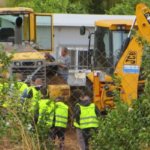2009 MachsomWatch report on Palestinian Nomads expulsion
July 12, 2009
http://www.canpalnet-ottawa.org/Jordan%20valley2.html
Stop Escalation in the Campaign for the Expulsion of Palestinian Nomads in the Jordan Valley
by Daphne Banai, MachsomWatch
Background
The Jordan Valley is home to some 55,000 Palestinians and 6,000 registered Jewish settlers (actual number is estimated at 4,000). The Jordan Valley constitutes the only link between the occupied West Bank and the rest of the world (through Jordan).
Since its occupation in 1967, Israel has imposed a special policy on this area in an attempt to isolate it from the rest of the West Bank for future annexation. In order to do so, special movement restrictions have been imposed on the Jordan Valley restricting travel to and from the rest of the West Bank, in addition to regular restrictions which apply to the entire West Bank.
All movement between the West Bank and the Jordan Valley is monitored through several military checkpoints, while most of the roads have been blocked.
Only cars of registered residents of the Jordan Valley are allowed to drive on Jordan Valley roads.
The area is rich in water. As is the practice in the rest of the Occupied West Bank, Israel has taken over all the water resources. Most of it (about 90%) is allotted to Jewish settlements, and the remaining 10%, is allotted to the Palestinian residents. The amount is insufficient and residents are left to suffer dry summers.
Most Palestinian residents reside in the town of Jericho and several other small villages. In addition, there are many shepherd tent dwellers. These people are not original nomads. Their origin is in Palestinian villages in the West Bank (Tamun, Tubas, and southern Mount Hebron), where they used to reside during the summer coming to the area only during the winter in order to herd their livestock. Some continue the practice, while others have been permanent residents since 1967 for fear they will not be allowed to return. They reside on lands belonging to Palestinians from Tamun and Tubas to whom they pay rent. They have no access to local water wells, whish have been taken over by Israel , and bring their water in water tanks attached to tractors, from other Palestinian villages in the West Bank.
The story of Al Hadidye
The tribe of Al Hadidye, one of the tribes who dwell in the area (162 persons, including 81 children) have been permanent residents in the area long before 1967 – their chief was born there in the 50’s and the Historian Nazmi Ju’aba states that they gradually settled in the area hundreds of years ago. The residents subsist through their livestock and own about 4,000 heads of cattle. The area was designated an agricultural zone by the British mandate. Order 1970, clause 90 states that permanent residents may remain in the area, and expulsion orders may not change their status.
In 1970 El Hadidiye was declared a closed military zone, yet in 1978, on the very same land, the Jewish settlement of Roi was founded. Ever since 1997 they have been facing continuous home demolitions. Attempts through the courts to prevent the demolitions and consequent expulsions (including appeals to the Israeli Supreme Court), have been rejected. The reason stated: they are not permanent residents, but nomads. Indeed the residents move periodically, but they move within a radius of one kilometer and always on the lands of Hadidiye. They have never willfully left the zone. In 1997, 2004, 2007 and March of 2008 the army demolished their tents, livestock structures, tin sheds and expelled them.
On December of 2006 the appeal of several families facing demolition orders was rejected by the Supreme Court on the grounds that they constitute a security risk to the neighboring settlement of Roi.
Since then 13- 14 families have already left the area, sold their livestock, abandoned their traditional way of life and moved to the villages of Atuf or Tamun.
The residents of Al Hadidiye have no need for financial aid despite their harsh conditions. They only ask to be able to continue to live on the same land they have been living since long before the area was ever occupied by Israel, and they ask to reopen the water well on their land, which Israel has blocked.
Sequence of recent harrassment (2009)
Israeli forces renew harassment of local tribes in order to expel them.
- On 29/05/09 dozens of concrete blocks were erected throughout the Jordan Valley declaring different areas military firing zones, prohibiting passage (photos attached). The signs have been placed next to Palestinian tent dwellings, agricultural areas of Jewish settlements and in one case next to a gate in Palestinian use under army authorization (Gohiya gate).
- On the 26/03/09 the residents of Arkuv Akraba were served with military orders demanding their immediate evacuation from “a closed zone”.
On the 31/05/09 five families from Al Hadidye were served with demolition orders and 7 more families (a total of 105 persons) were served with work stoppage orders, soon to be followed with demolition orders. Their lawyer has appealed and received an injunction until the next hearing on their case on the 25/06/09. The hearing will be conducted by a committee headed by Marco Ben Shabat: a settler.
- On the morning of the 4/06/09 Israeli Army bulldozers and troops arrived at Ras el Ahmar in the Jordan valley and destroyed different structures belonging to a total of 18 families- 13 housing structures, 19 livestock structures and 18 underground ovens. In addition one tractor, one water tank and one wheel cart were confiscated. Previous to the demolition five families relocated on their own account for fear of coming demolitions. A total of a 150 people were displaced, including 67 children.
On the 17/06/09 Israeli army bulldozers and troops arrived at Ein El Hilwe where they proceeded to destroy the tent dwellings and livestock structures of two families- a total of 20 people. The estimated damage is of 20,000 NIS.
The same day the Israeli army destroyed the tent dwellings, livestock structures and 3 water tanks of three families thereby demolishing all of Arkub Akraba, a nomadic tent cluster. A total of 28 persons, including 18 children, were displaced.
- From 21/05/09 to 30/05/09 the Israeli army performed daily incursions, searching the tent dwellings of Hadidye. On one occasion armed forces shot sound bombs into the sheep pen. The residents lodged a complaint before the civil administration officer in charge of the area and showed him the sound bombs. (source: OCHA)
- Over the last few weeks many young men from the area, including a 13 year old child, have been arrested by the security officers of the Roi and Bekaot settlements. Charges included- trespassing, theft of ammunitions, damaging the water pipes of the settlements. In all cases the arrested were detained for 2-8 days and later released. No charges were brought forward.
For more information :
ybanai@netvision.net.il
Daphne banai
MachsomWatch


